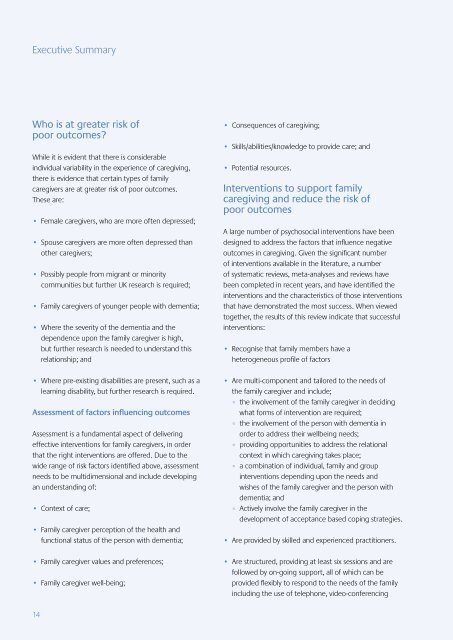The experiences needs and outcomes for carers of people with dementia
RSAS-ADS-Experiences-needs-outcomes-for-carers-of-people-with-dementia-Lit-review-2016
RSAS-ADS-Experiences-needs-outcomes-for-carers-of-people-with-dementia-Lit-review-2016
Create successful ePaper yourself
Turn your PDF publications into a flip-book with our unique Google optimized e-Paper software.
Executive Summary<br />
Who is at greater risk <strong>of</strong><br />
poor <strong>outcomes</strong>?<br />
While it is evident that there is considerable<br />
individual variability in the experience <strong>of</strong> caregiving,<br />
there is evidence that certain types <strong>of</strong> family<br />
caregivers are at greater risk <strong>of</strong> poor <strong>outcomes</strong>.<br />
<strong>The</strong>se are:<br />
• Female caregivers, who are more <strong>of</strong>ten depressed;<br />
• Spouse caregivers are more <strong>of</strong>ten depressed than<br />
other caregivers;<br />
• Possibly <strong>people</strong> from migrant or minority<br />
communities but further UK research is required;<br />
• Family caregivers <strong>of</strong> younger <strong>people</strong> <strong>with</strong> <strong>dementia</strong>;<br />
• Where the severity <strong>of</strong> the <strong>dementia</strong> <strong>and</strong> the<br />
dependence upon the family caregiver is high,<br />
but further research is needed to underst<strong>and</strong> this<br />
relationship; <strong>and</strong><br />
• Where pre-existing disabilities are present, such as a<br />
learning disability, but further research is required.<br />
Assessment <strong>of</strong> factors influencing <strong>outcomes</strong><br />
Assessment is a fundamental aspect <strong>of</strong> delivering<br />
effective interventions <strong>for</strong> family caregivers, in order<br />
that the right interventions are <strong>of</strong>fered. Due to the<br />
wide range <strong>of</strong> risk factors identified above, assessment<br />
<strong>needs</strong> to be multidimensional <strong>and</strong> include developing<br />
an underst<strong>and</strong>ing <strong>of</strong>:<br />
• Context <strong>of</strong> care;<br />
• Family caregiver perception <strong>of</strong> the health <strong>and</strong><br />
functional status <strong>of</strong> the person <strong>with</strong> <strong>dementia</strong>;<br />
• Family caregiver values <strong>and</strong> preferences;<br />
• Family caregiver well-being;<br />
• Consequences <strong>of</strong> caregiving;<br />
• Skills/abilities/knowledge to provide care; <strong>and</strong><br />
• Potential resources.<br />
Interventions to support family<br />
caregiving <strong>and</strong> reduce the risk <strong>of</strong><br />
poor <strong>outcomes</strong><br />
A large number <strong>of</strong> psychosocial interventions have been<br />
designed to address the factors that influence negative<br />
<strong>outcomes</strong> in caregiving. Given the significant number<br />
<strong>of</strong> interventions available in the literature, a number<br />
<strong>of</strong> systematic reviews, meta-analyses <strong>and</strong> reviews have<br />
been completed in recent years, <strong>and</strong> have identified the<br />
interventions <strong>and</strong> the characteristics <strong>of</strong> those interventions<br />
that have demonstrated the most success. When viewed<br />
together, the results <strong>of</strong> this review indicate that successful<br />
interventions:<br />
• Recognise that family members have a<br />
heterogeneous pr<strong>of</strong>ile <strong>of</strong> factors<br />
• Are multi-component <strong>and</strong> tailored to the <strong>needs</strong> <strong>of</strong><br />
the family caregiver <strong>and</strong> include;<br />
° the involvement <strong>of</strong> the family caregiver in deciding<br />
what <strong>for</strong>ms <strong>of</strong> intervention are required;<br />
° the involvement <strong>of</strong> the person <strong>with</strong> <strong>dementia</strong> in<br />
order to address their wellbeing <strong>needs</strong>;<br />
° providing opportunities to address the relational<br />
context in which caregiving takes place;<br />
° a combination <strong>of</strong> individual, family <strong>and</strong> group<br />
interventions depending upon the <strong>needs</strong> <strong>and</strong><br />
wishes <strong>of</strong> the family caregiver <strong>and</strong> the person <strong>with</strong><br />
<strong>dementia</strong>; <strong>and</strong><br />
° Actively involve the family caregiver in the<br />
development <strong>of</strong> acceptance based coping strategies.<br />
• Are provided by skilled <strong>and</strong> experienced practitioners.<br />
• Are structured, providing at least six sessions <strong>and</strong> are<br />
followed by on-going support, all <strong>of</strong> which can be<br />
provided flexibly to respond to the <strong>needs</strong> <strong>of</strong> the family<br />
including the use <strong>of</strong> telephone, video-conferencing<br />
14


